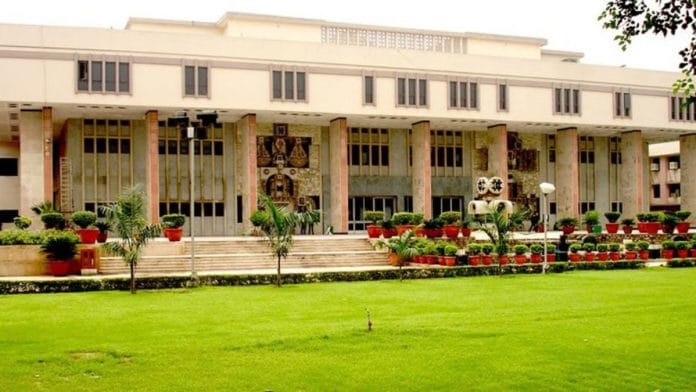New Delhi: Micro-blogging platform X, which was previously called Twitter, does not perform a public function or duty, the Delhi High Court has said, refusing to interfere with the suspension of a petitioner’s online account on the basis that it was a violation of fundamental rights.
The court said that the suspension of one’s account on such a platform cannot be said to be violative of fundamental rights since X is a private platform, and noted that fundamental rights are only enforceable against the state or bodies performing public functions.
“X Corp. provides a digital platform for communication and social interaction… Importantly, it is a privately owned entity that operates without specific governmental delegation or statutory obligations to perform any public duty”, the court said.
The crux of the legal battle before the Delhi HC stemmed from X’s decision to terminate the account of Sanchit Gupta, the petitioner, on the micro-blogging site. According to the petition, Gupta, who is an independent IT consultant, had subscribed to the premium services offered by the platform last year. These allow users to share in the revenue generated from organic impressions on advertisements under their posts.
However, in June this year, he observed a reduction in the reach of his posts. Allegedly, the microblogging platform then unilaterally terminated Gupta’s account without prior notice. Despite repeated requests, he alleged, it refused to reinstate his account, ending his revenue stream from X.
Seeking an immediate reinstatement of his account, he had approached the Delhi HC, alleging that the suspension was “arbitrary”, “discriminatory”, and a violation of his fundamental rights, such as the freedom of expression.
However, the court dismissed the petition on 24 July, noting that because X is not a public functionary but a private corporation, it cannot be held liable for guaranteeing such rights. What does that mean? ThePrint explains.
Fundamental rights violated, the remedy of ‘writs’
The Constitution of India provides for fundamental rights under Part III of the Constitution. These include rights such as the right to equality (Article 14), freedom of speech and expression (Article 19 (1) (a)) and the right to life (Article 21).
These rights have been the focal point of many debates, for instance in the cases on whether horizontal reservations are permissible under the reservation policy. Such rights can be enforced by constitutional courts under what is called the “writ jurisdiction”.
Writs, which are constitutional remedies, are ordered by the Supreme Court and High Courts against the violation of one’s fundamental rights guaranteed under Part III. These can include directions to authorities to act a particular way (mandamus), enquiries into how one occupies an office (quo warranto), the introduction of restrictions (prohibition) etc.
The Supreme Court can order such writs under Article 32 of the Constitution. High courts have a similar power to enforce fundamental rights under Article 226 of the Constitution, which also enables them to issue orders, prohibitions, directions etc to various authorities in India.
Dr B.R. Ambedkar had described this power as the heart and soul of the Constitution because of the protections it provides to the people.
“If I was asked to name any particular article in this Constitution as the most important — an article without which this Constitution would be a nullity — I could not refer to any other article except this one (Article 32). It is the very soul of the Constitution and the very heart of it,” Ambedkar had said.
Who can writs be issued against?
Under the constitutional framework, fundamental rights are not all-pervasive and may not be enforced against everyone. This means that, while anyone may violate fundamental rights, the court cannot provide a remedy in all cases.
Fundamental rights are ordinarily enforced against the ‘state’ under the Constitution. This includes local bodies such as municipal corporations, state governments, central governments, panchayats etc. However, in special circumstances, even private bodies can be subject to such rights. For instance, in the past, courts have issued writs against private, unaided schools.
Courts have held that where an authority is performing a “public function”, such rights can be enforced against private bodies. This is what the high court has referred to in the case against X. “The threshold for a private entity to be amenable to writ jurisdiction is that it must undertake functions that are fundamentally governmental in nature or are performed by virtue of power vested by law.”, the court said.
“This can include situations where the state has outsourced its functions to a private entity, or where the private entity performs a service that is so intertwined with state obligations that it becomes a necessary function for societal welfare”, the court explained.
To qualify as a public function, activities such as the collection of taxes and the maintenance of law and order may be included for the enforcement of such rights.
In the facts before the court, the HC noted that X was not carrying out any public duties and was a voluntary private platform. It could thus not be subject to the enforcement of such fundamental rights, it said.
“The platform is not mandated to carry out public duties. ‘X’ is voluntary and user-driven, distinguishing it from entities that operate under a compulsion of law or provide services that are essential public utilities”, the court concluded.
(Edited by Sanya Mathur)
Also read: Constitutional or just statutory? Your right to vote & why its status is contested






